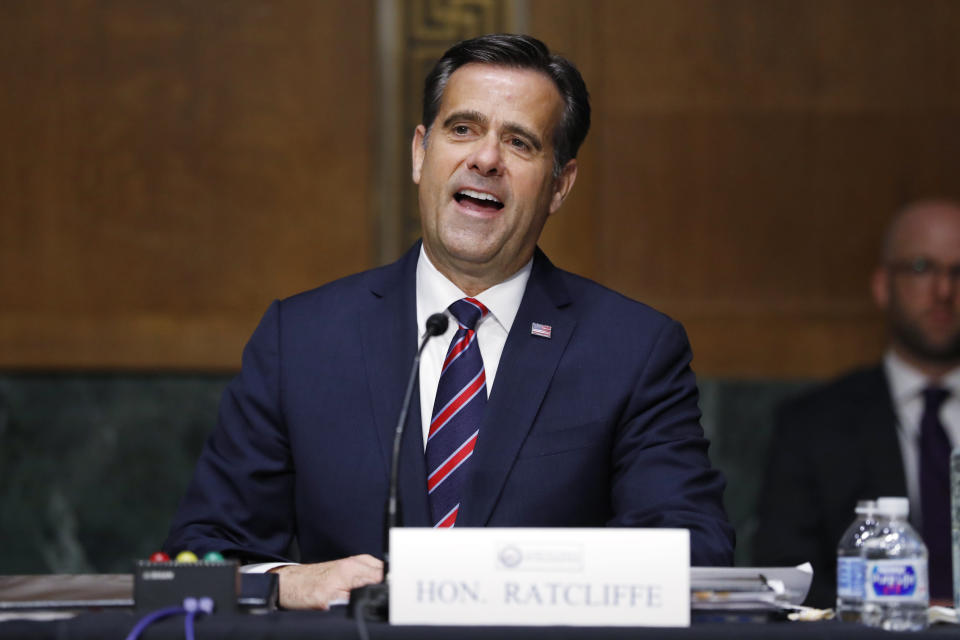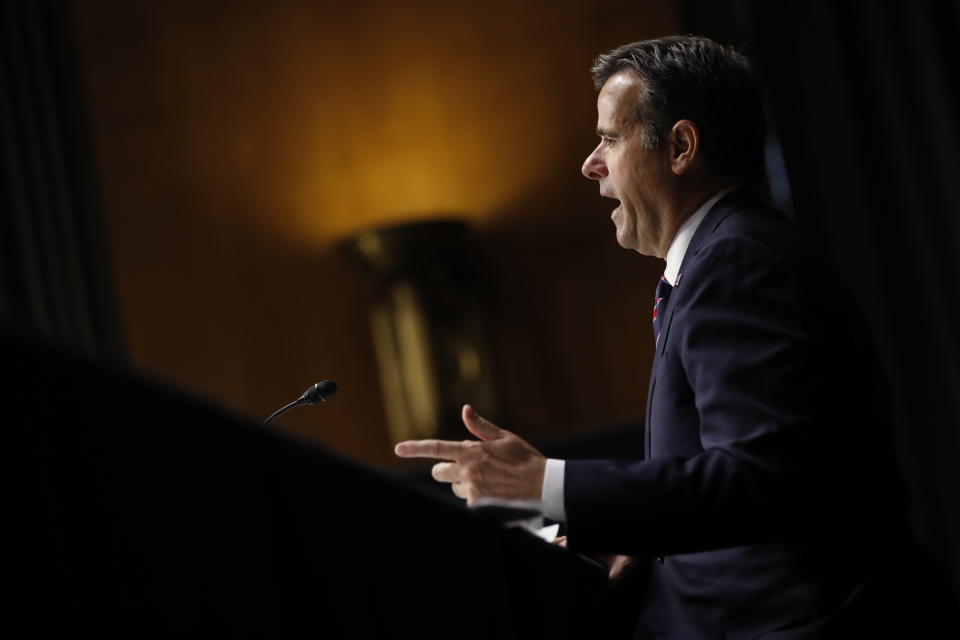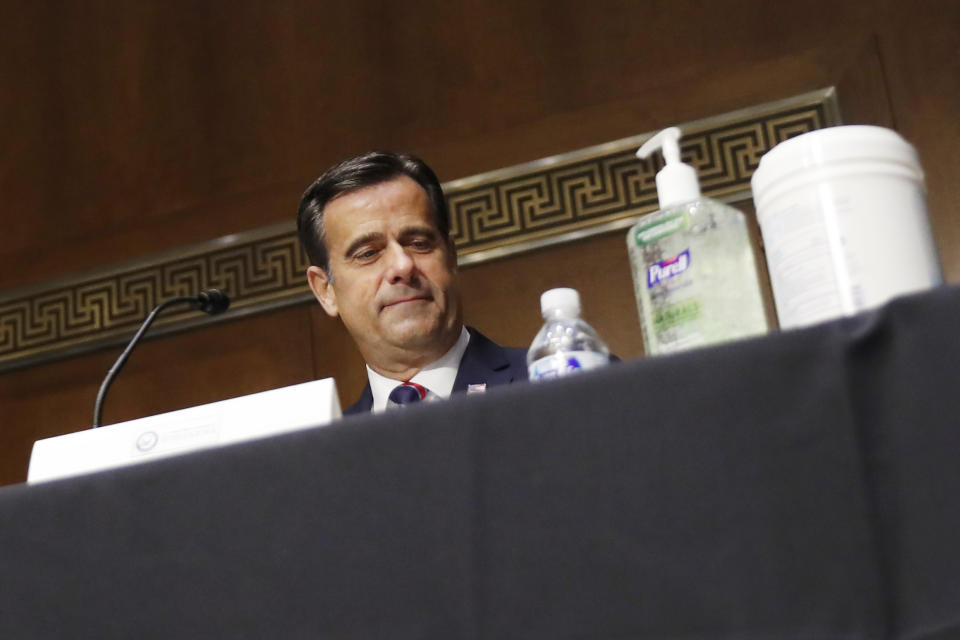Trump's pick for intel chief promises to keep politics out of coronavirus origins
Despite his reputation as a Trump loyalist, Rep. John Ratcliffe of Texas repeatedly pledged on Tuesday that he would, if confirmed as the next leader of the U.S. intelligence community, seek out and deliver to Congress and the White House the unvarnished truth on a range of national security issues, including the origins of the coronavirus pandemic.
“What anyone wants the [intelligence community] to say won’t impact the intelligence they get from me,” he told Sen. Angus King.
King, an independent from Maine, had pressed Ratcliffe on whether he would resist any attempts from inside the White House to go “conclusion shopping,” and avoid “pressing the intelligence community to find what [Trump] wants them to find” on the origins of the pandemic, a concern recently reported by the New York Times.
Yahoo News first reported that the intelligence community was still investigating whether the outbreak began as a result of outside contact with an infected animal in China, or whether Chinese researchers studying a natural sample of the virus may have accidentally been infected. The Office of the Director of National Intelligence confirmed in a statement published last week that it was looking at this theory.

It’s easy to promise not to alter intelligence products during a hearing. It’s impossible to know what he’ll do “until he’s in the job with the red editing pen in his hand staring at the [president’s daily brief],” wrote Cindy Otis, a former CIA analyst and author of a forthcoming book on disinformation, in a text message to Yahoo News. Most scientists argue that while the lab accident remains possible, it is unlikely based on the recent emergence of the virus and the sheer number of different bat coronaviruses present in the wild.
A source familiar with the matter told Yahoo News that the White House had tasked various intelligence community agencies including the Central Intelligence Agency and the Defense Intelligence Agency with determining whether the virus originated in a lab. It remains unclear, however, whether any forthcoming analysis issued on the subject might be misrepresented to the public.
The White House continues to place blame on the World Health Organization and Chinese officials for the devastating results of the pandemic so far. Trump, as well Secretary of State Mike Pompeo, have hinted that they have evidence the lab theory is accurate, but are not allowed to share it.
Those concerned about Ratcliffe's fitness to head the intelligence community point to past debates in which he’s been a Trump defender, for example, during the Russia investigation, and later, in the impeachment inquiry against Trump sparked by a CIA whistleblower.
Ratcliffe repeatedly insisted in response to various questions from members of the Senate Intelligence Committee during his confirmation hearing Tuesday that he would “speak truth to power,” and tell President Trump what the intelligence community believes and how confident they are in those conclusions, even if it puts his job at risk.
However, intelligence community veterans are skeptical he’ll live up to those promises, and remain concerned he’s unqualified based on his lack of experience in national security, a statutory requirement for the job.

Tracy Walder, a former CIA officer focused on counterterrorism and weapons of mass destruction, believes Ratcliffe could have been more insistent during the hearing in reflecting the DNI’s own public conclusion on the coronavirus origins: that it is definitely not a man-made bioweapon leaked from a Chinese lab.
“I think the most important thing he could do is say and acknowledge the information the intelligence community recently provided stating that this virus did not originate in a Wuhan lab,” she said.
“I mean, do I think China made up the numbers about how many were infected? Yes,” said Walder, who recently published a memoir called “The Unexpected Spy.” “But I think the idea that this originated as a bioweapon in a lab, that’s absolutely ridiculous. We need to step back and look at what the intelligence is saying.”
Chris Costa, a veteran intelligence officer of 34 years who served on President Trump’s National Security Council, noted that Ratcliffe said all the right things in the hearing — but would be challenged in the role to lead and demonstrate his commitment to those words.
“Rep. Ratcliffe’s role is to unflinchingly represent the intelligence community’s analytical judgements to the president, meaning providing ‘truth to power,’” Costa, currently executive director of the International Spy Museum, told Yahoo News. “Rep. Ratcliffe says he’s committed to those principles. Now, if confirmed, he needs to lead.”

The potential threat posed by China is becoming more fraught for intelligence officials who focus on the country but want to avoid blaming the coronavirus on Beijing alone without evidence. During the meeting, Ratcliffe said his biggest concern was China as an “emerging threat” due to its dominance in areas like 5G technology and cyberspace, as well as its role in obscuring the severity of the pandemic.
“All roads lead to China,” he said.
China and the pandemic were not the only issues Ratcliffe was asked about by senators. Given his past comments over a “secret society” within the FBI seeking to harm the president, and his attacks on the whistleblower whose complaint launched impeachment proceedings over President Trump’s overtures to Ukrainian officials requesting political favors in exchange for military aid, he will continue to have a lot to prove in order to lead the intelligence community.
During the hearing, Ratcliffe deftly avoided coming to specific conclusions about a number of politically sensitive issues, such as Russian interference in the 2016 election in favor of Trump, Iran’s compliance with the nuclear deal at the time Trump withdrew and whether he’d defend whistleblowers.
“Rep. Ratcliffe’s commitment to ‘follow the law’ reads well in a transcript, but he only committed to follow the executive branch’s interpretation of the law,” wrote Irvin McCullough, a national security analyst for the whistleblower protection nonprofit Government Accountability Project. “This can significantly diverge from congressional intent and have devastating consequences on intelligence oversight.”

As the nation’s top intelligence official, Ratcliffe would have limited authority over the activities of the other agencies. “The office is less relevant than ever in terms of actual substance, and there seems to be bipartisan support for changes to the structure,” said Marc Polymeropoulos, a former senior CIA officer who served in the Senior Intelligence Service until 2019. However, he argued, Ratcliffe or another nominee would play an important role “in terms of his or her access to the president.”
The director of national intelligence is also an important figurehead who can represent the opinions and needs of the broader workforce. Ratcliffe, who testified that he does not agree with the president that the intelligence community has “run amok,” will likely be challenged by lawmakers to defend his office’s staff against any political pressure.
During the confirmation hearing, Ratcliffe committed to attend the annual worldwide threats hearing, in which intelligence community leaders appear before Congress to discuss their unclassified views on the threats facing the United States. That hearing has been indefinitely postponed, however, reportedly out of fear of angering the president.
“I was heartened by the fact that he committed to do the Worldwide Threats Hearing,” wrote Nick Rasmussen, acting executive director of the McCain Institute for National Leadership and former director of the National Counterterrorism Center.
“Ratcliffe answered the truth to power questions very directly and in a way designed to engender confidence in the [intelligence committee] members,” he continued in an email to Yahoo News. “Whether he can and live up to the pledge he repeatedly made will only be borne out over time.”
_____
Click here for the latest coronavirus news and updates. According to experts, people over 60 and those who are immunocompromised continue to be the most at risk. If you have questions, please refer to the CDC’s and WHO’s resource guides.
Read more:


